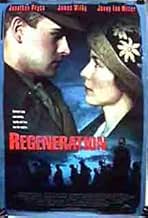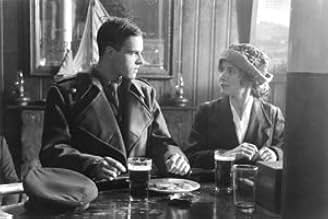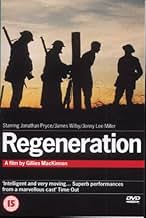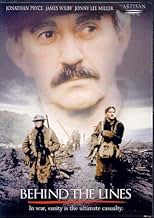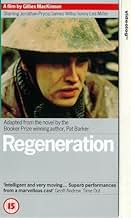Füge eine Handlung in deiner Sprache hinzuBased on Pat Barker's novel of the same name, "Regeneration" tells the story of soldiers of World War One sent to an asylum for emotional troubles. Two of those soldiers are England's most i... Alles lesenBased on Pat Barker's novel of the same name, "Regeneration" tells the story of soldiers of World War One sent to an asylum for emotional troubles. Two of those soldiers are England's most important WW1 poets.Based on Pat Barker's novel of the same name, "Regeneration" tells the story of soldiers of World War One sent to an asylum for emotional troubles. Two of those soldiers are England's most important WW1 poets.
- Regie
- Drehbuch
- Hauptbesetzung
- Nominiert für 1 BAFTA Award
- 17 Nominierungen insgesamt
Empfohlene Bewertungen
intelligent scenario which passes messages about how horrific war is
to the audience in the mildest yet touching way I've seen.
The story involves a hospital in Scotland where officers are sent when
they suffer a breakdown, a common phenomenon in the first and second
world wars. In there, a doctor (played by Jonathan Pryce) attempts to
treat his patients in a more humane way than the one other doctors of
the time choose. Through the stories of characters in the hospital --
including Siegfried Sassoon and Wilfred Owen, two poets who happen to
meet and become friends in the hospital -- the life of the British
soldiers in the first World War, as well as several political messages
about that affecting era for humanity are successfully transmitted to
the audience, without blood, without effects or huge battle scenes in
a way that touches and indicates its significance more than any other
film I've seen about the subject.
The performances are excellent, with Johny Lee Miller -- who apart
from this movie has not shown any signs of serious acting that I've
seen -- delivering a very good performance of a shocked and ambitious
officer and Jonathan Pryce metaphorically accepting the ideas of
Sassoon -- who opposes to the war after a point where he realises its
futility and the lack of values in the politicians driving it -- can
be though as the link between the soldiers and humanity itself.
It is definitely a movie I would recommend! Excellent.
The drama is based on real events, and the performances are quite stunning. Above all, Jonathan Pryce as Dr. Rivers is simply incredible, a man torn between duty and compassion, a doctor on the verge of becoming a patient himself. In a just world, he would have won an Oscar (but hardly anyone, it seems, saw this film on initial release). The handsome James Wilby gives a very fine performance as Sassoon--in fact, I've never seen him in better form. Johnny Lee Miller perfectly embodies the edgy anger, angst, and shame of Billy Prior. And Stuart Bunce brings a remarkably gentle, otherworldly quality to his haunting portrayal of Wilfred Owen. You absolutely believe that this man has a poet's soul; but he finds his voice not by contemplating beauty but by contemplating supreme horror.
There are many scenes from this film I will never forget--particularly, Dr. Rivers' trip to see another doctor cure a patient of being mute by applying electricity directly to his teeth and larynx. This scene is horrifying and, yet, like the rest of the film, restrained, in part because of the way Pryce portrays Rivers' reactions. Another unforgettable scene is the abrupt, shattering ending--but I won't give that away. Suffice it to say that words, especially the words of a great poet, sometimes are more powerful than shocking images.
This is a very intelligent, moving, humane, and important film. What a shame that it has been so overlooked.
Regeneration is a thoughtful anti-war film where the paradox of war is implied in a Scottish hospital for the treatment of shell shocked officers. The doctor has to get them well so they can be returned to the front lines, where they will more than likely be killed. The script is intelligent and the acting is superb. There are some allegorical scenes which do more to underscore the pigheaded arrogant mentality of the "establishment" which continued a war until quite simply, there was no one left to fight. Even sick men with TB were sent off to fight. Perhaps the saddest aspect of watching this film is when you realize that WWII began 21 years after the first once ended, just long enough for the new generation of soldiers to grow up.
"Regeneration" is different. It is not with graphically real blood spilled, but rather with powerfully wrenching emotion and with poetry that this film drives home what war does to the men (and women) caught up in its sweep. The film's use of the poems of Siegfried Sassoon and Wilfred Owen is stunning, and while perhaps even more of their incredible poetry could have been employed in the film, the ones the filmmaker employs are carefully and perfectly chosen.
This is a war movie because its focus is on the war's destruction of men. But do not go into this film expecting the action of the battlefield to play out on the screen. There are a few scenes from the fields of France, powerful and well-placed in the film. And throughout the movie, you can just hear the dull thudding of shells, as if from a great distance - a striking reminder of how physical distance does not mean emotional distance. But if you are interested in the emotional impact those shells had, in an examination of the struggle to recover from that impact, (through poetry, through love, and through therapy), and in the moral questions raised by war, this is a stunning, deeply moving film you will not soon forget.
The opening scenes are done quite like a painting. They are very impressive, and the overhead shots are simply majestic. The story, however, is set in a mental institution, where Doctor Rivers (played with brilliance by Jonathan Pryce) is set on 'curing' the shell-shocked patients. There are three that the movie focuses on in particular: Siegfried Sassoon, Wilfred Owen, and Billy Prior, respectively played by James Wilby, Stuart Bunce, and Johnny Lee Miller.
Previous comments have compared this film to Saving Private Ryan, yet there are several marked differences between the two. Ignoring the fact that they are set in two different wars, Saving Private Ryan examines the idea of heroism on the field, while Regeneration takes look on how war effects men psychologically.
Certainly a worthy look, and a fine addition to any film collection.
Wusstest du schon
- WissenswertesThe film used a lot of present and former Territorial Army soldiers as extras for larger scenes. This includes soldiers from 52nd Lowland, 6th Battalion Royal Regiment of Scotland, located in Hotspur street, Glasgow.
- PatzerThe camera and the crane on which it is suspended are reflected in several puddles during the very opening shot (of the battlefield).
- Zitate
Capt. William Rivers: I find it interesting that you don't stutter.
Billy Prior: I find it even more interesting that you do.
- Alternative VersionenReleased in the USA in a 96 minute version under the title "Behind the Lines".
- VerbindungenFeatured in The 100 Greatest War Films (2005)
- SoundtracksJust Before The Battle, Mother
Words and Music by George Frederick Root (As G.F. Root)
Performed by Craig Titus
Top-Auswahl
- How long is Regeneration?Powered by Alexa
Details
- Erscheinungsdatum
- Herkunftsländer
- Sprache
- Auch bekannt als
- Krigets dårar
- Drehorte
- Overtoun House, Dumbarton, West Dunbartonshire, Schottland, Vereinigtes Königreich(Craiglockhart Hospital)
- Produktionsfirmen
- Weitere beteiligte Unternehmen bei IMDbPro anzeigen
Box Office
- Bruttoertrag in den USA und Kanada
- 33.131 $
- Eröffnungswochenende in den USA und in Kanada
- 19.593 $
- 16. Aug. 1998
- Weltweiter Bruttoertrag
- 33.131 $
Zu dieser Seite beitragen



